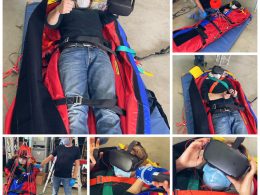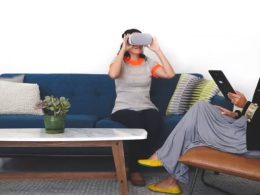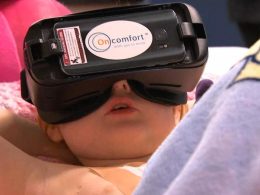Virtual reality is already being used in the UK for operations to reduce pain and after-effects. What makes VR better than conventional anaesthesia?
In the UK, VR goggles are increasingly being used in hospitals, hospices and nursing homes. The immersive technology helps people get through painful operations and seems to be slowly overtaking conventional anaesthetics, which have many dangerous side effects.
74-year-old undergoes knee surgery in virtual reality
It almost borders on a miracle: 74-year-old Ian McDonough dispensed with a conventional general anaesthetic during his knee operation. Instead, the doctors administered a nerve block and put VR glasses on him. McDonough experienced a live performance of the well-known Queen song Bohemian Rhapsody in virtual reality during the operation.
Five years earlier, McDonough's other knee was operated on under general anaesthesia. The surgery in virtual reality is much more pleasant and you recover from it much faster, he says. This experience distracted him from everything. All he felt was a pulling sensation, he said. "I would definitely recommend it as an alternative to a general anaesthetic," says McDonough.
VR Anaesthesia helps over 2,000 patients per year
At Northumbria Healthcare NHS Foundation Trust, different VR experiences are offered for surgeries. In addition to concerts or films, those responsible mainly focus on virtual walks through nature or observing wildlife. Similar to VR therapy for chronic pain, the focus is on breathing and mindfulness exercises during the VR experience.
"We started using VR headsets for elective orthopaedic procedures, such as knee replacements, but quickly found that the response was so positive that we have now expanded the service," says Dan Lawrence from Northumbria Health Trust's anaesthesia department. Besides the fear of surgery, the risk of possible side effects from general anaesthesia also decreased
Another positive side effect of VR anaesthesia is an economic one. According to Lawrence, in some cases there is no need for an overnight stay after general anaesthesia, which results in lower hospital costs. The hospital now has eight VR glasses: "We use them for regional and local anaesthesia and help up to 2,000 patients a year," says Lawrence.
VR in pain therapy: only one side effect
In addition to the positive experiences of hospitals, there are several studies that look at the effectiveness of VR during therapies, operations or other interventions.
In 2020, Health Technology Wales reviewed this available scientific evidence from clinical trials. The result: Virtual reality alleviates pain during and immediately after surgery more effectively than conventional treatments such as painkillers. With motion sickness, there is only one and very rare side effect.
Why is Virtual Reality effective for anaesthesia?
Gastroenterologist and author Brennan Spiegel explains the pain-relieving effect of VR in his Book VRx: How Virtual Therapeutics Will Revolutionize Medicine (Amazon link) as follows: "Its full revolutionary potential comes from its ability to force a person's brain and body to respond to a different reality."
People would use about fifty percent of their brain for visual processes. Bombarding the eyes with spectacular and dynamic visions would result in three billion neuronal firings per second. These ricocheted through half the brain to process the overwhelming amount of visual data. The pain disappears as if a hallucinogen had been administered.
Dr Jordan Tsigarides from the Rheumatology Department at the University of East Anglia, sees it similarly. VR is immersive and floods the brain with audio-visual signals. According to Tsigarides, senses are stimulated and the brain's attention is diverted from processing pain signals. VR can thus also break the thought cycle of people with chronic pain.









